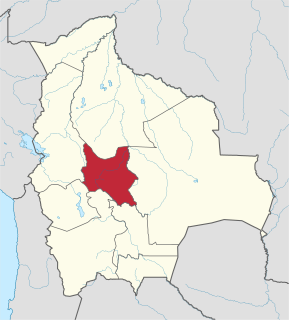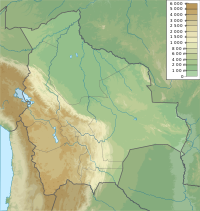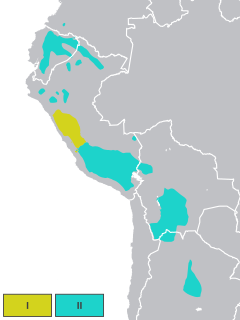
Quechua, usually called Runasimi in Quechuan languages, is an indigenous language family spoken by the Quechua peoples, primarily living in the Peruvian Andes and highlands of South America. Derived from a common ancestral language, it is the most widely spoken language family of indigenous peoples of the Americas, with a total of probably some 8–10 million speakers. Approximately 25% of Peruvians speak a Quechuan language. It is perhaps most widely known for being the main language of a family of the Inca Empire. The Spanish colonisers initially encouraged its use, but from the middle of their reign they suppressed it. However, Quechua ultimately survived, and variants are still widely spoken today.

Quechua people or Quecha peoples may refer to any or all speakers of the Quechua languages, which originated among the indigenous peoples of South America. Most Quechua speakers live in Peru, although there is a significant population living in Ecuador, Bolivia, Chile, Colombia and Argentina.
Cusco–Collao or Qusqu–Qullaw (Quechua) is a collective term used for Quechua dialects that have aspirated and ejective plosives, apparently borrowed from Aymaran languages. They include Cusco Quechua, Puno Quechua, North Bolivian Quechua, and South Bolivian Quechua. Together with Ayacucho Quechua, which is mutually intelligible, they form the Southern Quechua language.

Mizque is a province in the Cochabamba Department, Bolivia. Its capital is Mizque.

Cercado is a province in the Cochabamba Department, Bolivia. Its capital is Cochabamba which is also the capital of the department.
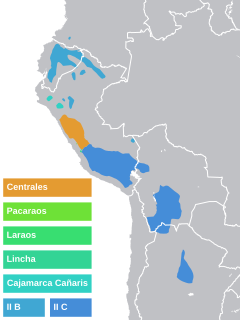
South Bolivian Quechua, also known as Central Bolivian Quechua, is a dialect of Southern Quechua spoken in Bolivia and adjacent areas of Argentina, where it is also known as Colla. It is not to be confused with North Bolivian Quechua, which is spoken on the northern Andean slopes of Bolivia and is phonologically distinct from the South Bolivian variety. Estimates of the number of speakers of South Bolivian Quechua range from 2.3 to 2.8 million, making it the most spoken indigenous language in Bolivia, just slightly greater than Aymara, with roughly 2 million speakers in Bolivia. In comparison, the North Bolivian dialect has roughly 116,000 speakers.

Southern Quechua, or simply Quechua, is the most widely spoken of the major regional groupings of mutually intelligible dialects within the Quechua language family, with about 6.9 million speakers. It is also the most widely spoken indigenous language in the entire New World. The term Southern Quechua refers to the Quechuan varieties spoken in regions of the Andes south of a line roughly east–west between the cities of Huancayo and Huancavelica in central Peru. It includes the Quechua varieties spoken in the regions of Ayacucho, Cusco and Puno in Peru, in much of Bolivia and parts of north-west Argentina. The most widely spoken varieties are Cusco, Ayacucho, Puno (Collao), and South Bolivian.

Vacas Municipality is the second municipal section of the Arani Province in the Cochabamba Department in central Bolivia. Its capital is Vacas known as the "Land of the potato". During the Inca Empire Vacas served as a tampu along the Inca road system that led to Inkallaqta and Pocona.

Alalay Municipality is the third municipal section of the Mizque Province in the Cochabamba Department, Bolivia. Its seat is Alalay.

Alalay is a location in the Cochabamba Department in central Bolivia. It is the seat of the Alalay Municipality, the third municipal section of the Mizque Province.
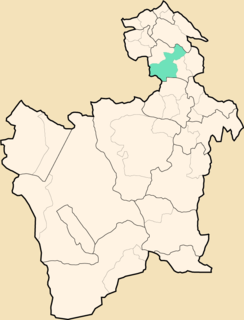
Colquechaca or Qullqichaka is the first municipal section of the Chayanta Province in the Potosí Department in Bolivia. Its seat is Colquechaca.
North Bolivian Quechua is a dialect of the Southern Quechua language, spoken in northern Bolivia on the Peruvian border, as well as by immigrants in Peru.

A lliklla is a rectangular, handwoven shoulder cloth. It is worn by Quechua women of the Andes region in Bolivia and Peru. Traditionally it is fastened at the front using a decorated pin called tupu.

Jatun Ch'utu is a mountain in the Bolivian Andes which reaches a height of approximately 3,400 m (11,200 ft). It is located in the Cochabamba Department, Mizque Province, Alalay Municipality.

Jatun Urqu is a mountain in the Bolivian Andes which reaches a height of approximately 3,680 m (12,070 ft). It is located in the Cochabamba Department, Mizque Province, Alalay Municipality. It lies northeast of Jatun Urqu.

Puka Qallpa is a 3,886-metre-high (12,749 ft) mountain in the Bolivian Andes. It is located in the Cochabamba Department, Mizque Province, Alalay Municipality. It lies northwest of Kachi Q'asa and northeast of Inka Pirqa. The Puka Urqu Mayu flows along its western slope. Its waters flow to the Jatun Mayu in the south.

Wanq'uni is a mountain in the Bolivian Andes which reaches a height of approximately 3,760 m (12,340 ft). It is located in the Cochabamba Department, Mizque Province, Alalay Municipality. It lies northeast of Inka Pirqa.

Siwinqani is a mountain in the Bolivian Andes which reaches a height of approximately 3,600 m (11,800 ft) high. It is located in the Cochabamba Department, Mizque Province, Alalay Municipality.

Putu Phutunqu is a 4,112-metre-high (13,491 ft) mountain in the Bolivian Andes. It is located in the Cochabamba Department, Carrasco Province, Pocona Municipality and in the Mizque Province, Alalay Municipality. Putu Phutunqu lies southeast of Inka Pirqa.


